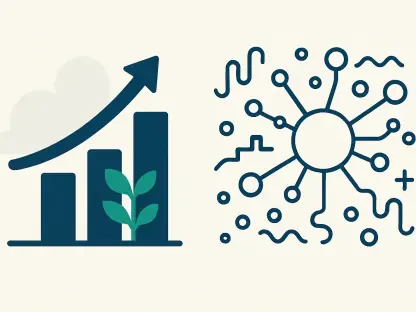As Asia experiences an unprecedented surge in smartphone penetration and technological advancements, the mobile phone insurance market is undergoing a significant transformation. Central to this evolution is the integration of Artificial Intelligence (AI), a force driving innovation, efficiency, and customization, reshaping the landscape of mobile insurance services across the region. AI’s transformative capabilities extend beyond mere automation, influencing consumer behavior, enhancing operational practices, and defining new market strategies, thereby setting a new standard for insurance solutions.
AI Transformations in Insurance
Automation and Efficiency
AI technologies are revolutionizing the insurance landscape by enhancing operational efficiencies, particularly in underwriting processes and claims management. Automated systems can swiftly analyze vast data sets, minimizing manual errors and enhancing service delivery speed. This technological leap is vital in an industry where expediency is crucial for maintaining competitive advantage. By implementing AI, insurance providers can streamline operations, improve decision-making, and reduce the time taken to process claims, thus responding more effectively to customer needs. In addition to fast-tracking routine processes, predictive analytics powered by AI enables insurers to anticipate potential claims before they occur. These AI-driven tools can predict device malfunctions or likely damages, allowing insurers to proactively offer preventive measures and solutions. Such interventions not only reduce the frequency and volume of claim submissions but also significantly boost customer satisfaction. By preemptively addressing potential issues, insurers foster a more robust relationship with their clientele, cultivating trust and loyalty in an increasingly competitive market.
Fraud Detection
Fraudulent activities within the insurance sector present significant challenges, threatening to compromise both financial stability and consumer trust. AI technologies offer robust solutions to counter these threats by deploying machine learning algorithms capable of detecting unusual patterns in claim data. These advanced systems help mitigate fraud risks by identifying potentially deceptive claims, thus safeguarding the integrity of the business and maintaining a fair environment for genuine policyholders. The implementation of AI-driven fraud detection mechanisms enhances transparency and fosters trust among stakeholders. Insurers use real-time threat monitoring systems to ensure a secure transaction environment, which is crucial for maintaining consumer confidence. By harnessing AI capabilities, companies can streamline their fraud detection processes, reducing both the incidence and impact of fraudulent claims while optimizing operational costs through efficient resource allocation.
Enhancing Customer Experience
Personalization
AI is at the forefront of delivering personalized insurance solutions tailored to meet individual consumer needs. By leveraging data-driven insights, insurers can customize their offerings in alignment with specific user profiles, making their products more relevant and appealing to diverse audiences. This level of personalization enhances customer engagement, increasing loyalty and driving retention rates, which are critical in fostering sustained business growth. AI technologies such as chatbots facilitate seamless interactions by providing automated assistance round-the-clock. These AI-driven virtual agents can enhance user experience by promptly responding to inquiries, guiding customers through the purchase process, and resolving issues efficiently. As a result, overall consumer satisfaction is elevated, leading to a more favorable perception of insurance services.
Accessibility and Convenience
AI is reshaping the mobile insurance landscape by significantly enhancing accessibility and convenience for consumers. Advanced applications equipped with AI capabilities offer intuitive navigation and seamless service access, particularly engaging tech-savvy users across urban and rural areas. By aligning user interfaces with AI insights, insurers simplify traditionally complex processes like policy selection and claim filing, reducing customer effort and accelerating platform adoption rates. Optimizing insurance platforms with AI tools ensures smooth interactions and hassle-free service delivery. This technological integration is critical in an era where consumers prioritize easy, quick, and effective solutions. As AI continues to enhance user interfaces, the insurance sector strengthens its appeal, demonstrating adaptability and foresight in meeting the demands of a changing consumer base.
Expanding Market Opportunities
Integration with IoT
The integration of AI with the Internet of Things (IoT) is paving the way for innovative insurance solutions that focus on preventive measures and risk assessments. The connectivity enabled by IoT devices provides real-time data, allowing insurers to monitor device health remotely and offer dynamic coverage plans tailored to current conditions. This integration enhances the ability to deliver proactive customer service, reducing the likelihood of claims and improving customer satisfaction. As IoT integration becomes more widespread, insurers are prompted to develop new insurance products that cater to evolving consumer needs driven by technological progress. Smart data-sharing platforms born from the AI-IoT synergy contribute to this evolution by generating novel insurance solutions and offering flexible coverage options. This ability to adapt and expand services presents significant opportunities for Asia’s mobile insurance market to grow and thrive.
Emerging Economies
AI introduces significant avenues for growth in emerging economies characterized by rapid digital transformation. These countries experience heightened demand for insurance services due to increasing investment in technology infrastructure, offering lucrative opportunities for mobile insurers to solidify their market presence. As these economies continue to evolve, the expansion of digital insurance services is poised to meet the rising consumer demand for tailored and accessible coverage solutions. By forging partnerships with local tech companies, insurers accelerate their market entry and strengthen their competitive position. These collaborations enable seamless service integration, facilitating the capture of emerging opportunities within the region’s diverse markets. As insurers navigate the dynamic landscape of these burgeoning economies, AI provides the tools necessary to capitalize on new prospects and ensure sustainable market expansion.
Challenges and Strategic Adaptations
Regulatory Compliance
Operating within Asia’s complex regulatory framework requires strategic application of AI to ensure compliance without stifling innovation. Balancing adherence to varied local regulations with the flexibility needed for technological advancement requires meticulous planning and adaptation. Insurance providers must align their business practices with evolving standards across different nations while maintaining a competitive edge. AI aids insurers in managing these regulatory requirements effectively. Automated systems can monitor compliance metrics, offering adaptive strategies that align business operations with shifting legal landscapes. This technological support is crucial for insurers looking to engage in cross-border expansion while ensuring that their innovations comply with local regulatory frameworks.
Rural Accessibility
Despite the widespread impact and potential of AI, the deployment of mobile insurance services in rural areas faces persistent challenges. Limited internet connectivity and insufficient technological infrastructure often hinder insurance penetration, necessitating innovative solutions to bridge these gaps and enhance service reach. Insurers must develop strategies that address rural accessibility issues and promote comprehensive coverage. Combining AI insights with offline strategies and agent networks can augment the deployment of mobile insurance in rural areas. On-the-ground efforts to educate and engage rural populations can significantly improve outreach and adoption rates. By fostering a robust presence in less connected regions, insurers can extend their market reach and ensure that consumers from all demographic segments benefit from comprehensive insurance solutions.
Competitive Landscape
Strategic Partnerships
Insurers are increasingly leveraging strategic partnerships to boost their AI capabilities and redefine their business models. Collaborations with technology firms enhance digital innovation efforts, equipping companies with cutting-edge solutions to meet contemporary insurance demands. By strategically aligning with AI experts, insurers can seamlessly integrate advanced technologies into their operations, reshaping how insurance is conceptualized and delivered. Joint ventures with telecommunications providers facilitate market penetration by expanding distribution channels. These partnerships increase service accessibility, allowing insurers to cater to diverse and widespread consumer bases effectively. By positioning themselves within existing telecommunications networks, insurers can capture significant market shares and foster growth in the competitive landscape of Asian mobile insurance.
Technological Investments
As Asia witnesses an unprecedented rise in smartphone usage and rapid technological progress, the mobile phone insurance industry is also undergoing a significant shift. At the heart of this transformation is the integration of Artificial Intelligence (AI), a powerful tool driving innovation and efficiency while offering customized solutions and reshaping mobile insurance services across the continent. AI’s impact goes beyond just automating processes—it plays a pivotal role in influencing consumer behavior, refining operational practices, and establishing new strategies for the market. Consequently, these advancements set a fresh standard for insurance solutions, marking a new era for mobile phone insurance offerings. AI is enabling insurers to better predict and understand customer needs, allowing for more personalized policies that cater to individual requirements. By analyzing vast amounts of data, AI helps in identifying patterns and potential risks, leading to a greater level of accuracy in pricing and claims. This not only enhances customer satisfaction but also streamlines operations, reducing the likelihood of fraud and improving overall service efficiency. As this technology continues to evolve, the potential for further innovation in the mobile insurance sector becomes increasingly promising, paving the way for a future where insurance solutions are more intuitive and tailored than ever before.









